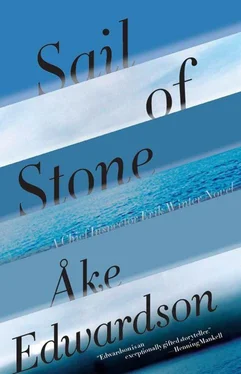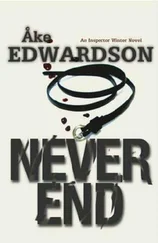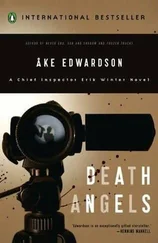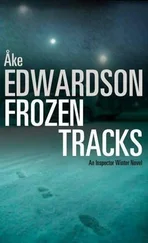“Anette called me,” said Susanne.
Aneta was still standing in the hall. Bellner and Johannisson were going to wait in the stairwell, at least for the first few minutes. The door was standing open.
“Are you alone?” asked Aneta.
“Alone? Of course I’m alone.”
“What did she want?”
“Her dad had hit her,” said Susanne. “Again.”
“Her dad?”
“Yes.”
“And… again?”
“Didn’t you realize that’s what’s going on?” said Susanne.
“Why didn’t you say so before?” asked Aneta, who was still standing in the hall.
“She didn’t want to. Anette.”
“Why not?”
“I don’t know.”
“Where’s Anette now?”
“Down by the sea,” said Susanne.
“Alone?”
“Yes, what the fu… what do you think?”
“Where’s her dad, then?”
“In town.”
“Where in town?”
“I don’t know. But he’s not down there. That’s why she drove there.”
“Drove there? How?”
“In my car,” said Susanne. “She borrowed my car.”
“Where’s your brother?”
“I don’t know.”
“He wasn’t along in the car?”
“No, no.”
“It’s important that you tell the truth, Susanne.”
“The truth? The truth? What do you know about the truth?”
“I don’t understand,” said Aneta.
“You think that Hans was pursuing Anette, but you don’t know anything.”
“Tell me the truth, then.”
“Hans may have his different sides, maybe he can seem stra… seem wei…”
Aneta watched the light come and go on the woman’s face.
Why has Anette herself been so quiet?
There’s something else. Something more. A different silence.
“I called down there. She didn’t answer,” said Aneta.
“She’s there,” said Susanne.
After their overnight visit with Macdonald’s uncle, they drove into Aberdeen before lunch. The city gleamed in its light granite, which became darker as you got closer.
They drove directly to the train station. Sarah and Angela’s train to Edinburgh would be leaving in twenty-five minutes. It had been Sarah’s suggestion.
“Angela really has to see Edinburgh and you two are about to go in the other direction.”
“It’s wild and beautiful on the north coast,” Macdonald had said.
“Maybe we can meet up again there,” Angela had said. “And I’m happy to go with Sarah down to Edinburgh.”
“Civilization,” Sarah Macdonald had said.
“Let’s say two days max,” her husband had said. “Maybe we can meet up again in Kingussie.” He had explained to Winter and Angela: “Good place up at the top of the Highlands. There’s a train from Edinburgh via Perth up to there. Doesn’t even take two hours.”
Winter and Macdonald drove directly to force headquarters on the other side of Union Street. It was right across from the Aberdeen Arts Centre and was flanked by two churches.
Police Inspector Marion McGoldrick received them on the seventh floor. She was thin, very small, and she had a determined chin, dark eyes, and a sharply tailored uniform. She was another old acquaintance of Steve Macdonald’s.
“Now’s the time to use them,” he had said the day before.
Marion McGoldrick was around thirty-five. There was a little pile of documents on her desk; she had done what she could. Macdonald suspected that she had done it on her own time. In Aberdeen there was no time for the police to mess around with favors during normal working hours.
“I hope I didn’t take up your free time, Mar,” said Macdonald.
“You did. But I don’t have anything else to do.”
“That’s too bad.”
“On the contrary, Steve. On the contrary.” She gave a quick toss of her thick black hair and smiled thinly.
“What have you found?” Macdonald asked, straight out.
“The accident,” she said, “but of course that’s no surprise.”
“And nothing new has popped up?” asked Macdonald.
“No,” said Mar. “The trawler was on its way in with its course set for the lighthouse at Kinnaird Head, I assume, and something happened somewhere, some unknown number of nautical miles northwest, and it went down. With everything.” She looked down at the paper. “ Marino. Funny name. Usually boats have women’s names. Like Marina. Now there’s a classic name for a boat.”
“The crew had stayed here in Aberdeen before then,” said Winter.
“Yes. Lived on the boat in the harbor, mostly down in Albert Basin.”
“All of them?” asked Macdonald.
“Yes; apparently they were a gang who didn’t go around telling every Tom, Dick, and Harry that they were here. But the authorities registered them, of course, once they had ended up here on the other side of the minefield. I have the names here.”
She held out a piece of paper. Winter took it.
He read the names on the copy of an official document, written in neat handwriting: Bertil Osvald, Egon Osvald, John Osvald, Arne Algotsson, Frans Karlsson.
There were five of them, thought Winter. He knew that. But why weren’t there eight? A fishing boat in those days had a crew of eight.
“There were three of them along on the final journey, of course,” said Mar.
Winter nodded. Egon Osvald, Frans Karlsson, John Osvald.
Now Bertil Osvald was dead and Arne Algotsson was in his own world.
“But it wasn’t just those three who went out, was it?” asked Macdonald.
Mar made a little movement with both hands.
“There’s no information to indicate that any other fisherman hired the Marino, ” she said. “A thorough investigation was done after the boat disappeared, of course, but no one else seems to have been along. And no next of kin made contact after the accident.” She put down the paper she was holding in her hands. “That says a lot right there.”
“And the boat was never found?” asked Macdonald. “I mean the wreckage.”
“No.”
“Maybe it isn’t a wreck,” Winter said, taking a step forward. None of them had considered sitting down in the little room. “Maybe you just uttered a Freudian slip, Steve.”
“Please explain, Chief Inspector,” said Mar.
“Maybe the Marino never went down,” said Winter. “Maybe they just disappeared. For some reason. Crime, revenge, I don’t know. Sailed in a different direction.”
“Rio de Janeiro,” said Macdonald.
“Haven’t you had that thought, Steve?” said Winter.
“They wouldn’t get away,” said Mar.
“No?” said Winter.
“Absolutely not. You have to understand that it simply wasn’t possible to hide a boat on the coast at that time, least of all a fishing boat, a trawler. There was a war. You can say what you want about the coast guard today, but at that time they took their duty seriously. It was just a fact that there were German U-boats in the water around here, and destroyers, and God knows what out in the North Sea, and we took it seriously.”
“But the smuggling did continue during the war,” said Macdonald.
“Not with the Germans,” said Mar.
“But it did continue.” Macdonald sat down suddenly but immediately got up again. “There were harbors. Secret harbors, or at least as secret as they could be for their purposes.”
“No one smuggled secretly back then,” said Mar.
“I call that a contradiction,” said Macdonald.
“The authorities knew everything,” said Mar. “Believe me, Steve. I know something about it because my grandfather was one of the worst. Or the best, if you look at it that way.”
“Best worst what? Coast guard or smuggler?”
“Smuggler,” she said, smiling. “Up in Sandhaven.”
Читать дальше












